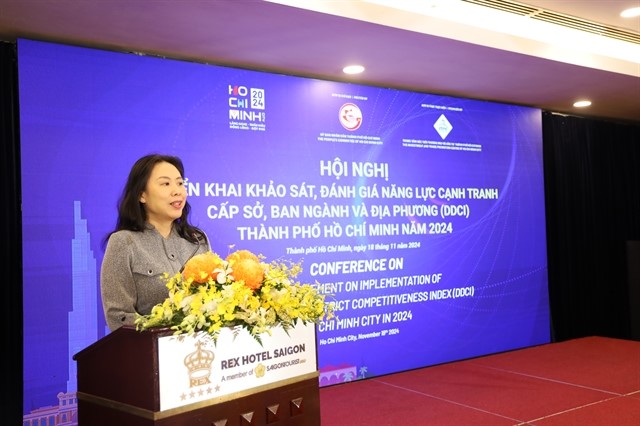HCM City will evaluate the competitive capacity of 28 government departments and agencies for the 2024 Department and District Competitiveness Index (DDCI), up from 25 last year, a conference heard on Monday.

HCM City will evaluate the competitive capacity of 28 government departments and agencies for the 2024 Department and District Competitiveness Index (DDCI), up from 25 last year, according to a conference held on Monday.
The three additional units to be assessed this year are the city People's Committee Office, Department of Home Affairs and Market Management Department.
Speaking at the conference to announce implementation of this year’s survey, Hồ Thị Quyên, deputy director of the Investment and Trade Promotion Centre of HCM City, said that, by conducting the survey, the city aims to enhance administrative procedures, improve the governance of departments and districts and create a transparent and conducive investment and business environment across sectors.
The assessment would remain largely unchanged from last year but would include some adjustments to better align with current functions, responsibilities, and realities, she said.
In the survey, 28 districts and agencies will be evaluated based on nine indicators, 38 common criteria, and 63 specific criteria tailored to individual units.
The indicators include transparency, access to information and digital transformation; unofficial costs; time spent on administrative procedures; fair competition; support for business; legal institutions; and dynamism, creativity and effectiveness of departments, divisions and sectors.
The city’s 21 districts and Thủ Đức City will be assessed based on 10 indicators, including land access and land use stability.
The Green Index and the Health and Living Environment Indicator are also assessed to foster sustainable development.

By integrating environmental and health factors into the evaluation framework, the city aims to protect the environment, improve quality of life and build a green, eco-friendly economy. This demonstrates its commitment to balancing economic growth with environmental and community responsibilities, the ITPC said.
The assessment will be conducted through both online surveys and direct interviews with businesses, cooperatives and strategic investors and a valid response rate of at least 30 per cent for both departments and districts will be ensured.
The survey results will be thoroughly analysed to offer in-depth evaluations and recommendations for both high- and low-ranking groups.
Quyên, of the ITPC, said that preparatory work for the survey and assessment is well underway, with results expected to be announced by the end of 2024.
To ensure transparency and objectivity, the city has invited experts from business associations, research institutes, and universities to join the evaluation council, she said.
The results would serve as a foundation for the city to propose solutions to address problems and deploy solutions to better serve the public and businesses, fostering a better investment environment, she added.
At the conference, the business community expressed their hope that the assessment of the competitiveness of departments, agencies and localities in the city would lead to improvements in information transparency, effectiveness of business support, and a reduction in time and informal costs.
They also emphasised the importance of protecting the confidentiality of corporate and individual information of survey participants to ensure an objective and genuine evaluation.
This would help avoid superficial, perfunctory assessments and overly lenient feedback that would not accurately reflect reality, they added.
With a clear roadmap and implementation plans, the city People's Committee expects the 2024 DDCI to make a positive contribution to the reform and modernisation of public administration, according to the survey evaluation council.
This is the third annual survey.
Last year’s exercise found that most city departments and localities showed improvements in their scores, reflecting a strong sense of responsibility and reform efforts.
Some moved up sharply from mid- and lower-tier positions in 2022 to achieve high rankings.
But there were also drops in rankings, including by agencies that had held high ranks in 2022, though this decline did not indicate a lack of capability, reforms or improvement efforts. Instead, it indicated that their efforts were insufficient to outperform others or meet the ever-increasing expectations of the business community, according to the survey. — VNS
- Tags
- HCM City





